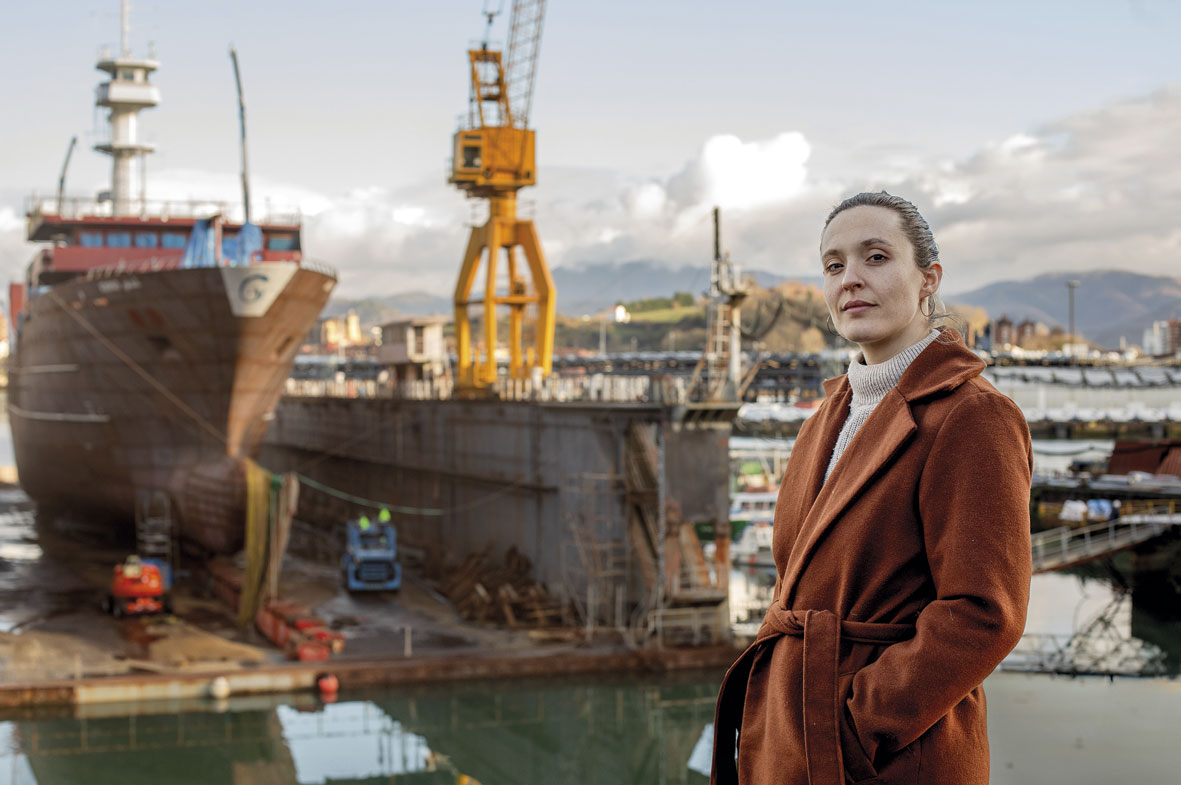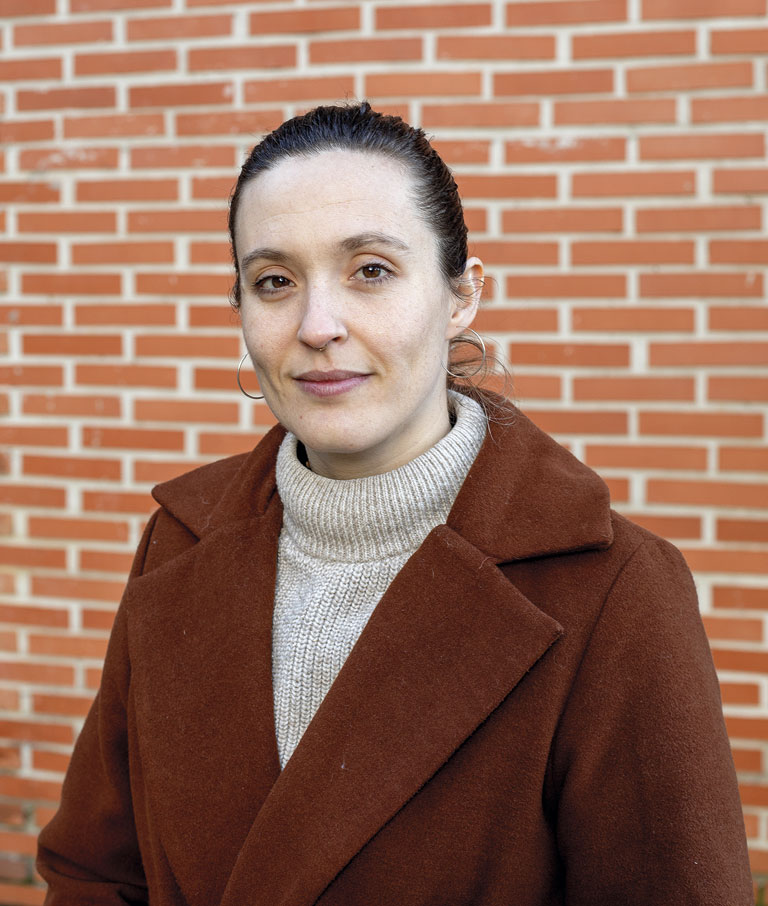“Thanks to the Liher group I learned to be free on stage”
- Lide Hernando Muñoz (1991, San Sebastian) maintains a “non-exclusive open relationship” with music. After a pause with the Liher group, he just launched his musical project Bele. He recently introduced the book Izotz ura, with the editorial Susa. It is the beginning of a post-decision stage of living in creation, with great limitations, but without limits. “I want to do what I want,” he says.

“22 urterekin Literatura masterra egin nuen. Musikan konfiantza gehiago izan dut idazten baino. Irakasleak, onena, dakigunari buruz idaztea zela esan zigun. Horregatik, liburua gaur egungo musika industria barrutik ezagutzen duen baten testigantza fikzionatua da. Pertsonaiek nire bi pentsaera islatzen dituzte, askotan talkan egon direnak. Idaztean ohartu naiz gizarteak, guk, polarizatu ditugula bi jarrera horiek, eta onartu egin behar ditugula kontraesanak. Batzuetan, gurekoiago jokatu nahi dugu, eta besteetan, supermilitanteak izan nahi dugu, eta dena egin gainontzekoengatik. Bi postura horiek islatzen ditu bi nesken adiskidetasun harremanetik”.
How would you define your
relationship with music? It has gradually become the most central part of my life. At the moment, I left my main job, which was the trade, in September, and now I am dedicated to singing. Every day I have a concert or a conference. At the moment, it gives me more happiness than misfortune, even if the road is hard. The way the industry is organized is not fair, for many reasons, but music gives me a lot, I don't tire, and I hope it does for a long time.
When and how were your first notes?
I started being 21 years old in music. From a young age I sang at home and at the ikastola. The professor of trikitixa used to sing and singing at the school. When I finished my career, I bought the guitar, and then I started playing my own songs. Then I met a pianist and played in the street for two summers for tourists in San Sebastian. It was a great lesson, because every day we played on the street 2-3 hours. So I started studying, along the way, so I didn't tire of the voice. When I was 22-23, I got the first model.
Few reasons, a long time was your first solo model, then came the Liher group. What does Lide de de Liher and Lide have?
Release. At first I was standing and didn't allow my freedom to be natural. Over time, thanks to the Liher group, I learned to be free on stage. On the contrary, Liherrek Leadetatik, although he has hardened the style, has received my pronunciation, so-comprehensive singing.
"Now I'm sad that young groups call management companies: first try to make your way, move in those waters and discover how easy or difficult it is."
With Liher you have burned the temples. Now what?
Continue music in other formats. The lives of adults are becoming more and more complicated and we will be able to stay to rehearse: having coffee or going out of the garden. I want to meet them, but I don't have to play. We have intentionally announced an indefinite interruption, despite fear. It is not that we want to leave it, but that we do not want to limit the pause, if we feel like we get together and we start again. We have been playing over 400 concerts in Euskal Herria and in Europe for eight years, and we are physically and mentally tired. We love each other a lot, but we want to get into other things, not just music. We want to open the parentheses and throw some menos.La strength,
the voice and body it gives to those directly is huge. Is the attitude of the stage a conscious option?
Evolution has been natural, not selective. Music moves you forward, if it was a more intimidating melody, it would move me less. However, the presence is not movement and the clothing leaves physics. I'm very proud of the liberty gained over time, as I go onstage and click, and I try to forget what people think: who I am, where I come from, at what age ... From song to song, sometimes that bubble breaks, and I get back, I start laughing.
The Bele project has just begun. What do you want to offer when you look at it?
Bele is a different music for fun. The sound we are generating does not currently exist in Euskal Herria, although it can be compared to some. What we're doing is pretty good for Euskal Herria. I want to show you that you can spend well dancing, ending with a smile, enjoying a nice concert. African American music has never been widely welcomed in the Basque Country, we have always resorted to whiter themes: British rock or pop, folk... I have always drank of African-American music, soula, aranbi…

Is the cultural scene in Basque changing?
At full speed. You stay constantly behind. The presence of 300 musical news at the Durango Fair last year is spectacular considering the population we live. The pandemic caused the breakdown of turns and turns, but people started producing at home. Currently, the premises are not full, the rock or the noise that was made in the garages, and now they are not. It's always changing.
For example, in the music industry, people go to business management. They're sharks, they're getting bigger and smaller and smaller. There are many young groups. The fact that the Gaztetxe network is becoming weaker has contributed to this. Before, by calling the queserías, I could do it on my own. Now I am sad that young groups call management companies: first try to make your way, move in those waters and discover how easy or difficult it is. Many public holidays are also organised by companies, and there is also a contradiction there.
Which cultural industry do you dream of?
Diverse. People do all the styles that you can imagine in Basque, but the industry is not so horizontal. In the industry I imagine there would be a wide variety of creations, and the media would also make room for all of them. In this way, people would be trained to listen to different music and not just four known styles of always. It would be many small management companies that would try to get our work out and not live from our work.















